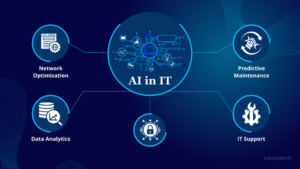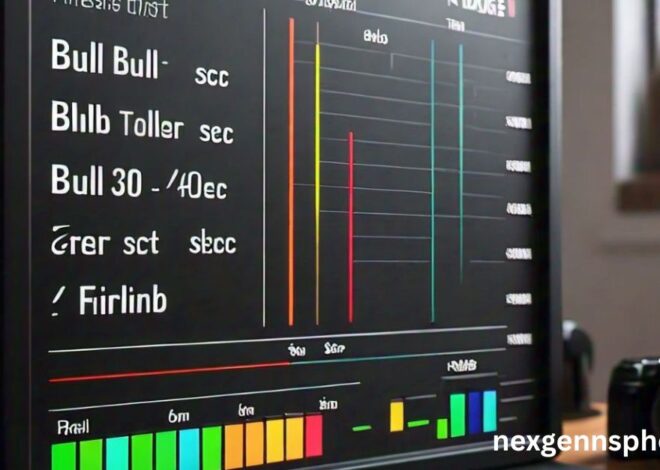
9 most effective applications of ai in fintech
Artificial Intelligence (AI) has revolutionized the financial industry, commonly referred to as Fintech, by introducing innovative solutions that streamline processes, enhance customer experiences, and mitigate risks. Let’s explore the nine most effective applications of AI in Fintech and how they are reshaping the landscape of finance. We’ll discuss in this article about 9 most effective applications of ai in fintech.
Definition of AI in Fintech
AI in Fintech refers to the integration of artificial intelligence technologies, such as machine learning and natural language processing, into financial services to automate tasks, analyze data, and provide personalized recommendations.
Importance and impact on the financial industry
The adoption of AI in Fintech has significantly impacted the financial industry, leading to increased efficiency, improved decision-making, and enhanced customer satisfaction. From fraud detection to personalized financial advice, AI-powered solutions are driving innovation and transforming traditional banking and investment practices. We’ll discuss in this article about 9 most effective applications of ai in fintech.
AI-Powered Fraud Detection
One of the most critical applications of AI in Fintech is fraud detection and prevention. Man-made intelligence calculations examine immense measures of information progressively to recognize dubious exercises and examples that might demonstrate deceitful ways of behaving.
How simulated intelligence is utilized to identify and forestall false exercises
AI algorithms analyze transaction data, user behavior, and other relevant variables to detect anomalies and flag potentially fraudulent transactions. These algorithms learn from past patterns and continuously adapt to new threats, making them highly effective in combating financial fraud. We’ll discuss in this article about 9 most effective applications of ai in fintech.
Benefits of AI-driven fraud detection systems
AI-driven fraud detection systems offer several benefits, including improved accuracy, faster response times, and reduced false positives. By automating the detection process and minimizing manual intervention, financial institutions can better protect themselves and their customers from fraudulent activities.
Algorithmic Trading
Algorithmic exchanging, otherwise called robotized exchanging, depends on simulated intelligence calculations to execute exchanges founded on pre-characterized models and economic situations. We’ll discuss in this article about 9 most effective applications of ai in fintech.
Utilizing AI algorithms for automated trading

AI algorithms analyze market data, news feeds, and other relevant information to identify trading opportunities and execute trades with minimal human intervention. These algorithms can process vast amounts of data in real time, enabling faster and more accurate trading decisions. We’ll discuss in this article about 9 most effective applications of ai in fintech.
Advantages of algorithmic trading in Fintech
Algorithmic trading offers several advantages, including increased efficiency, reduced transaction costs, and improved risk management. By removing emotional biases and human errors from the trading process, AI-driven algorithms can optimize trading strategies and generate better returns for investors.
Customer Service Chatbots
AI-powered chatbots are transforming customer service in the financial industry by providing instant assistance and personalized support to customers.
Enhancing customer service with AI-powered chatbots
Computer-based intelligence-controlled chatbots utilize regular language handling and AI calculations to figure out client requests and give important reactions. These chatbots can deal with a large number of questions, from account requests to exchange debates, without the requirement for human intercession. We’ll discuss in this article about 9 most effective applications of ai in fintech.
Improving user experience and reducing response times
Customer service chatbots improve user experience by offering 24/7 support, reducing wait times, and providing instant responses to customer inquiries. By automating routine tasks and inquiries, financial institutions can free up human agents to focus on more complex issues and high-value interactions.
Credit Scoring and Risk Assessment
AI plays a crucial role in credit scoring and risk assessment by analyzing vast amounts of data to determine creditworthiness and assess the likelihood of default.
AI’s role in analyzing creditworthiness and assessing risks
AI algorithms analyze various factors, including credit history, income, debt-to-income ratio, and behavioral patterns, to generate credit scores and assess credit risk. These algorithms can identify patterns and trends that traditional credit scoring models may overlook, leading to more accurate and predictive risk assessments. We’ll discuss in this article about 9 most effective applications of ai in fintech.
Improving accuracy and efficiency in lending decisions

By leveraging AI for credit scoring and risk assessment, financial institutions can improve the accuracy of lending decisions, reduce the risk of default, and offer more personalized lending products to customers. This enables better access to credit for underserved populations and promotes financial inclusion.
Personalized Financial Recommendations
AI-powered recommendation engines analyze customer data and behavior to provide personalized financial advice and recommendations. We’ll discuss in this article about 9 most effective applications of ai in fintech.
Using AI to provide personalized financial advice
AI algorithms analyze customer transaction data, spending habits, investment preferences, and life events to generate personalized financial recommendations. These recommendations may include budgeting tips, investment opportunities, and savings goals tailored to individual needs and goals.
Tailoring recommendations based on individual preferences and goals
Customized monetary suggestions enable clients to settle on informed monetary choices and accomplish their monetary objectives all the more. By leveraging AI to understand customer preferences and behaviors, financial institutions can build deeper relationships with customers and drive engagement and loyalty.
Anti-Money Laundering (AML) Compliance
AI assists financial institutions in detecting and preventing money laundering activities by analyzing transaction data and identifying suspicious patterns and behaviors. We’ll discuss in this article about 9 most effective applications of ai in fintech
How AI assists in AML compliance efforts
AI algorithms analyze transaction data, customer profiles, and other relevant information to detect anomalies and flag potentially suspicious activities. These algorithms can identify patterns and trends indicative of money laundering schemes and alert compliance teams for further investigation.
Enhancing detection and reporting of suspicious activities
By leveraging AI for AML compliance, financial institutions can improve the effectiveness of their compliance efforts, reduce false positives, and streamline the detection and reporting of suspicious activities. This enables financial institutions to meet regulatory requirements more effectively and protect themselves and their customers from financial crimes.
Robo-Advisors
Robo-advisors are automated investment platforms that use AI algorithms to provide investment advice and manage investment portfolios on behalf of clients. We’ll discuss in this article about 9 most effective applications of ai in fintech.
Automated investment platforms powered by AI
Robo-advisors use AI algorithms to analyze customer preferences, risk tolerance, and investment goals to build and manage diversified investment portfolios. These platforms automate the investment process, from portfolio construction to rebalancing, to optimize returns and minimize risk.
Making investment decisions based on algorithms and data analysis
Robo-advisors leverage AI to make data-driven investment decisions based on market trends, economic indicators, and risk factors. By removing human biases and emotions from the investment process, robo-advisors can provide more objective and disciplined investment strategies to clients.
Regulatory Compliance Automation

AI streamlines regulatory compliance processes in the financial industry by automating manual tasks, analyzing vast amounts of data, and ensuring adherence to regulatory requirements and standards. We’ll discuss in this article about 9 most effective applications of ai in fintech.
Streamlining regulatory compliance processes with AI
AI algorithms automate various compliance tasks, such as customer due diligence, transaction monitoring, and regulatory reporting, to improve efficiency and reduce human errors. These algorithms can analyze large volumes of data in real time and flag potential compliance issues for further investigation.
Ensuring adherence to financial regulations and standards
By leveraging AI for regulatory compliance, financial institutions can ensure adherence to complex regulatory requirements and standards, such as KYC (Know Your Customer), AML (Anti-Money Laundering), and GDPR (General Data Protection Regulation). This reduces the risk of non-compliance penalties and reputational damage and enhances trust and confidence among regulators and customers.
9 most effective applications of ai in fintech
Artificial intelligence (AI) is revolutionizing the financial technology (fintech) industry by offering innovative solutions that enhance efficiency, security, and customer experience. One of the most effective applications of AI in fintech is fraud detection and prevention. AI algorithms can analyze vast amounts of transaction data in real time to identify suspicious patterns and flag potentially fraudulent activities, helping financial institutions mitigate risks and protect customers from unauthorized transactions. We’ll discuss in this article about 9 most effective applications of ai in fintech
Another key application is algorithmic trading, where AI-powered algorithms analyze market trends, news, and other factors to execute trades automatically and optimize investment strategies. AI-driven chatbots and virtual assistants are also transforming customer service in fintech, providing personalized support, answering queries, and facilitating transactions through natural language processing and machine learning. Additionally, AI-powered credit scoring models leverage alternative data sources and predictive analytics to assess creditworthiness more accurately, enabling lenders to make faster and more informed lending decisions.
Other notable applications include robo-advisors for automated investment management, predictive analytics for risk management, anomaly detection for cybersecurity, personalized financial recommendations based on user behavior, and compliance monitoring for regulatory requirements. Overall, the integration of AI technologies in fintech is reshaping the industry landscape, driving innovation, and delivering tangible benefits to businesses and consumers alike.
Cybersecurity Enhancement
AI strengthens cybersecurity measures in the financial industry by identifying and mitigating cybersecurity threats more effectively and proactively. We’ll discuss in this article about 9 most effective applications of ai in fintech.
AI’s role in strengthening cybersecurity measures
AI algorithms analyze network traffic, detect anomalies, and identify potential cybersecurity threats, such as malware, phishing attacks, and data breaches. These algorithms can learn from past incidents and continuously adapt to new and evolving cyber threats, making them highly effective in protecting financial institutions’ systems and data. We’ll discuss in this article about 9 most effective applications of ai in fintech.
Identifying and mitigating cybersecurity threats more effectively
By leveraging AI for cybersecurity enhancement, financial institutions can detect and respond to cybersecurity threats more quickly and accurately, reducing the risk of data breaches and cyberattacks. This enables financial institutions to safeguard sensitive information, protect customer assets, and maintain trust and confidence in the security of their systems and services. We’ll discuss in this article about 9 most effective applications of ai in fintech
AI-Powered Market Analysis

AI analyzes market trends, economic indicators, and other relevant data to predict future movements and trends in financial markets.
Analyzing market trends and predicting future movements with AI
AI algorithms analyze vast amounts of market data, news feeds, social media sentiment, and other relevant information to identify patterns and trends that may impact financial markets. These algorithms can predict future market movements, identify potential investment opportunities, and inform investment strategies and decisions. We’ll discuss in this article about 9 most effective applications of ai in fintech.
Enhancing investment strategies and decision-making
By leveraging AI for market analysis, financial institutions and investors can make more informed investment decisions, optimize investment strategies, and capitalize on market opportunities. This enables investors to achieve better returns and manage risks more effectively in dynamic and volatile financial markets.
Blockchain Integration
AI complements blockchain technology in Fintech by enhancing transparency, security, and efficiency in financial transactions. We’ll discuss in this article about 9 most effective applications of ai in fintech
How AI complements blockchain technology in Fintech
AI algorithms analyze blockchain data, identify patterns, and detect anomalies to improve transparency and security in financial transactions. These algorithms can enhance fraud detection, identity verification, and transaction monitoring on blockchain networks, making them more reliable and secure.
Further developing straightforwardness, security, and effectiveness in monetary exchanges
By integrating AI with blockchain technology, financial institutions can improve transparency, security, and efficiency in financial transactions, such as payments, settlements, and asset transfers. This enables faster and more secure transactions, reduces transaction costs, and mitigates risks associated with fraud and cybersecurity threats. We’ll discuss in this article about 9 most effective applications of ai in fintech.
Smart Contract Automation
AI automates contract execution and enforcement using smart contracts, self-executing contracts with the terms of the agreement directly written into code. We’ll discuss in this article about 9 most effective applications of ai in fintech.
Automating contract execution and enforcement using AI
AI algorithms analyze contract terms, conditions, and performance metrics to automate contract execution and enforcement processes. These algorithms can trigger contract actions, such as payments and deliveries, based on predefined criteria and real-time data, without the need for human intervention.
Streamlining legal processes and reducing transaction costs
By leveraging AI for smart contract automation, financial institutions can streamline legal processes, reduce administrative overhead, and minimize transaction costs associated with contract execution and enforcement. This enables faster and more efficient contract management and reduces the risk of disputes and delays. We’ll discuss in this article about 9 most effective applications of ai in fintech.
AI-Based Wealth Management

AI powers personalized wealth management services that analyze customer data, investment goals, and risk preferences to optimize asset allocation and investment strategies. We’ll discuss in this article about 9 most effective applications of ai in fintech.
Leveraging AI for personalized wealth management services
AI algorithms analyze customer financial data, investment objectives, and risk tolerance to develop customized investment plans and asset allocation strategies. These algorithms continuously monitor market conditions and portfolio performance to optimize investment decisions and maximize returns.
Optimizing asset allocation and investment strategies
By leveraging AI-based wealth management services, investors can achieve better diversification, reduce portfolio risk, and maximize returns over the long term. This enables investors to achieve their financial goals more effectively and build wealth over time. We’ll discuss in this article about 9 most effective applications of ai in fintech.
Conclusion
In conclusion, the applications of AI in Fintech are vast and diverse, ranging from fraud detection to personalized wealth management. By leveraging AI technologies, financial institutions can improve efficiency, enhance customer experiences, and drive innovation in the financial industry. As AI continues to evolve and advance, we can expect to see even more transformative applications that reshape the future of finance.
FAQs
How does AI improve fraud detection in Fintech?
- AI analyzes transaction data and user behavior to identify patterns and anomalies indicative of fraudulent activities, enabling financial institutions to detect and prevent fraud more effectively.
Are AI-powered chatbots replacing human customer service representatives in the financial industry?
- While AI-powered chatbots offer instant assistance and personalized support to customers, they are not replacing human customer service representatives. Instead, they complement human agents by handling routine inquiries and tasks, allowing human agents to focus on more complex issues and high-value interactions. We’ll discuss in this article about 9 most effective applications of ai in fintech.
Can AI accurately assess credit risk and make lending decisions?
- Yes, AI algorithms can analyze vast amounts of data to assess creditworthiness and make lending decisions based on risk factors, such as credit history, income, and debt-to-income ratio. These algorithms improve the accuracy and efficiency of lending decisions, enabling financial institutions to offer personalized lending products to customers.
What are the advantages of utilizing robo-counsels for venturing the board?
- Robo-advisors automate investment management processes, provide personalized investment advice, and optimize portfolio allocation based on individual goals and risk preferences. They offer convenience, lower costs, and objective investment decisions, making them attractive options for investors seeking diversified and well-managed portfolios. We’ll discuss in this article about 9 most effective applications of ai in fintech.
How does AI contribute to regulatory compliance in the financial sector?
- AI automates regulatory compliance processes, such as customer due diligence, transaction monitoring, and reporting, to ensure adherence to regulatory requirements and standards. By analyzing vast amounts of data and identifying potential compliance issues, AI enhances the effectiveness and efficiency of compliance efforts, enabling financial institutions to meet regulatory obligations and maintain trust and confidence among regulators and customers. We’ll discuss in this article about 9 most effective applications of ai in fintech.


